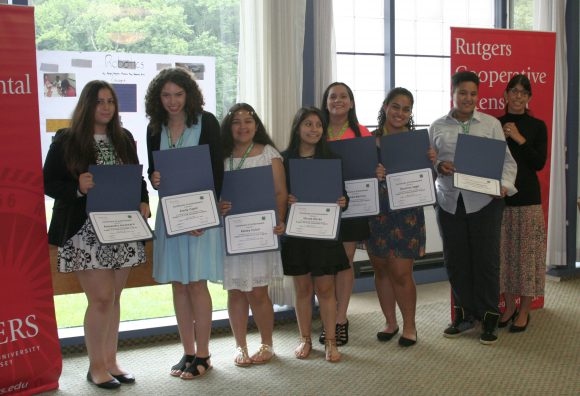
4-H Summer Science Participants from Hudson County.
Annual 4-H Summer Science Program was held July 10-14 on the Cook Campus
More than 60 urban high school students from seven New Jersey Counties participated in hands-on STEM (science, technology, engineering and mathematics) activities for a week alongside Rutgers faculty at the 9th annual 4-H Summer Science Program on the Rutgers-New Brunswick campus.
The annual Rutgers 4-H Summer Science Program began in 2009 with the objective of encouraging young people to participate in and gain a better understanding of opportunities available in STEM through a series of interactive activities.
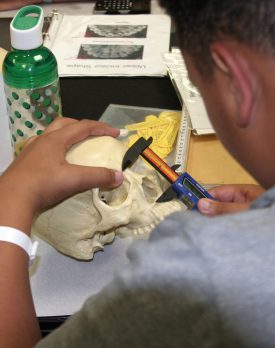
Collecting data on a skull for the purposes of gender and race identification.
This week saw these high school students performing experiments and collecting data in forests, on skeletons, on food microbes and in the Raritan River. They toured labs, learned about research and worked with Rutgers scientists. And they experienced a little of university life, living in the dorms, participating in recreational activities and eating the dorm food.
In one session the students learned how to identify the gender and race of a person by examining and measuring the bones of a skeleton and comparing the data they collected to well-known physical facts about human beings.
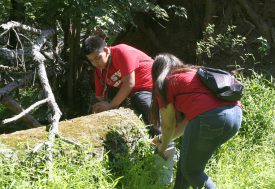
Collecting data for the purpose of mapping Superstorm Sandy tree damage.
Students collected information about trees that had been felled by Superstorm Sandy. With a mobile app, a tape measure, a compass—and some knowledge from a tree expert—they collected data on the types of trees that fell, their diameter, their height and the direction of the winds that knocked them down. The data that was recorded in the app helps scientists understand what happens in forests when storms hit.
These students were even seen seining ‘on the banks of the old Raritan’ to find out what kinds of creatures live in this well-known Rutgers waterway.
Then these future scientists produced their own projects and presented them on the final day to parents, faculty and 4-H staff before a celebratory luncheon at the Nielson Dining Hall. They proved to themselves that they have what it takes to pursue a STEM career.
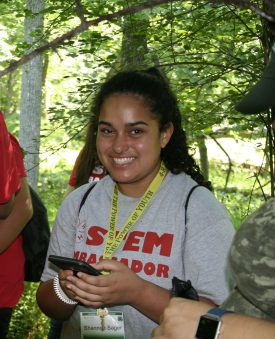
Using the mobile app to input tree data.
The commitment doesn’t stop there. As a condition for participating in the program, these young people became 4-H STEM Ambassadors, providing a minimum of 50 hours of service to their local 4-H program, sharing their experiences and knowledge with other young people and working with 4-H staff in their communities. They received training during the week to carry out their ambassadorships.
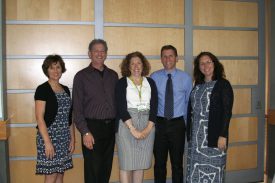
Rutgers Cooperative Extension personnel left to right: Christine Bean, STEM programs administrator; Larry Katz, director; Janice McDonnell, 4-H agent; Chad Ripberger, 4-H agent and Mercer County Extension department head; Rachel Lyons, chair 4-H Youth Development.
“Part of the 4-H youth development mandate is to prepare and empower our youth to get involved in a career in science, especially in our urban communities,” said Chad Ripberger, Rutgers Cooperative Extension (RCE) 4-H agent, Mercer County.
While the overall objective of 4-H has always been the development of youth as individuals and as responsible and productive citizens, the 21st century model of 4-H has expanded to serve a variety of communities, including specific programming for urban youths.
Janice McDonnell, 4-H STEM agent and co-founder—along with Ripberger—of the Summer Science Program, explained that National 4-H unveiled STEM as a critical part of its mandate and said that RCE has been playing a larger, vital role in creating both interest and competency in these areas.
At the celebratory luncheon Larry Katz, RCE director, congratulated the students, scientists and parents for a successful week and encouraged them to continue to pursue their interest in science and follow their passions, hopefully to Rutgers!
After lunch, students heard from keynote speaker Sunita Gupta Kramer, associate dean for Academic Affairs, Rutgers Honors College. The event ended with the presentation of certificates of achievement to each of the students in recognition of their successful participation in the Rutgers 4-H STEM Ambassador Program.
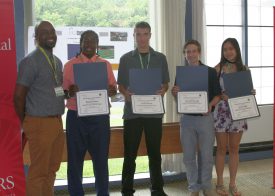
Atlantic County 4-H STEM Ambassdors.
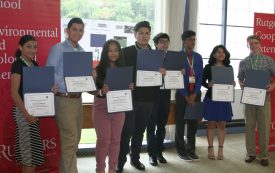
Essex County 4-H STEM Ambassdors.
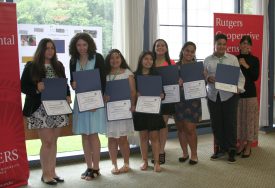
Hudson County 4-H STEM Ambassadors.
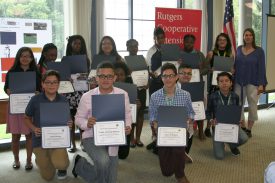
Mercer County 4-H STEM Ambassadors.
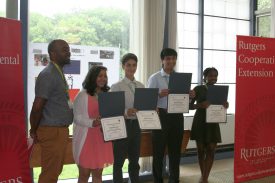
Middlesex County 4-H STEM Ambassadors.
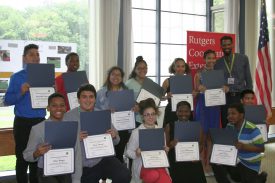
Passaic County 4-H STEM Ambassadors.
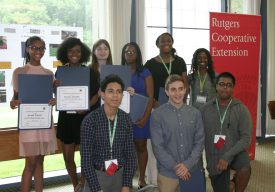
Union County 4-H STEM Ambassadors.

